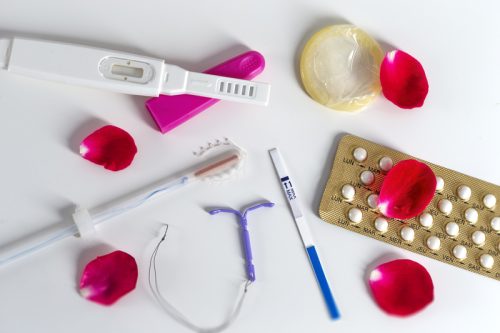Taking birth control is a popular and effective method of pregnancy prevention, also known as contraception. There are many birth control options available for young women, including hormonal methods such as oral contraceptive pills, mini-pill, hormonal intrauterine devices (IUDs), copper IUDs, and vaginal rings, or nonhormonal barrier methods such as the female condom.
All of these methods of birth control are effective at preventing unintended pregnancy. You can discuss the best option for you with your obstetrics health care provider here at Great City Medical.
But did you know that taking hormonal birth control can have many women’s health benefits other than just contraception?
Keep reading to learn more about the benefits of birth control.
What are the benefits of taking birth control?
In addition to preventing pregnancy, taking hormonal birth control can provide many health benefits for women.
- Regular periods
- The hormones in birth control pills can help regulate your period. Birth control contains hormones called estrogen and progesterone, which mimick the hormones that your body naturally makes. Most birth control pill packs contain three weeks of active hormones and one week of inactive pills without hormones. Your period will come during the week you take the inactive pills. That way, your period should always come every three weeks and last for no more than a week. This can be a great benefit for anyone struggling with irregular periods or long menstrual cycles.
- Lighter, less painful periods
- In addition to regulating when you get your period, birth control pills can also help control your period symptoms. Taking birth control pills prevents ovulation and thins the uterine lining. This means your menstrual cycle will likely become much lighter and less painful over time, with less bleeding and fewer cramps. This makes birth control pills a great option for anyone struggling with heavy bleeding, painful cramps, and other side effects.
- Relieve endometriosis symptoms
- Women with endometriosis — a condition where the uterine lining grows outside of the uterus and causes heavy, painful periods — can benefit from taking birth control. Taking birth control pills will not cure endometriosis, but it can help manage the symptoms of endometriosis. Taking birth control can help reduce the growth of the uterine lining and reduce painful cramps and heavy bleeding.
- Prevent ovarian cysts
- Ovarian cysts, which are painful collections of fluid built up on the ovary, can be caused by hormonal imbalance. Taking birth control can help balance hormones and reduce the risk of developing cysts on the ovary.
- Relieve PCOS symptoms
- Polycystic ovarian syndrome (PCOS), is a condition caused by hormone imbalance when the ovaries produce too much testosterone. It is a common condition in girls and young women. Taking birth control can help balance hormones, reduce excess levels of testosterone, regulate your period, and control other potential symptoms such as acne and unwanted hair growth.
- Reduce acne
- Acne can be caused by hormonal imbalances and fluctuations. Birth control is commonly taken to balance these hormones and reduce hormonal acne. Acne tends to clear after several months on the pill.
- Lower risk of ovarian cancer and endometrial cancer
- Taking hormonal birth control can lower your risk of certain cancers, including ovarian and endometrial cancer. Women who have taken birth control have up to 50% less risk of getting ovarian cancer and up to 30% less risk of getting endometrial cancer. The longer you take the pill, the lower your risks become. The effect is long-acting, as women can benefit from a decreased risk of these cancers for years after they stop taking the pill.
- Lower risk of anemia
- Anemia is a common condition in women. It occurs when you do not have enough red blood cells to carry oxygen in your body. Symptoms of anemia include extreme fatigue, weakness, and frequent bruising. Taking birth control can help prevent heavy blood loss during your period and reduce the risk of anemia.
Does your body change on birth control?
Some women do report gaining or losing weight while taking the birth control pill as a contraceptive method. However, in most cases, any weight change tends to be very minimal and temporary.
Taking birth control might also affect body composition. Some women may find it more difficult to put on muscle mass while on the pill.
However, risks of body changes are very low, especially if you are taking birth control with very low doses of hormones. Most birth control pills today contain very low levels of hormones compared to historical treatments.
Can the pill make you infertile?
While birth control pills prevent pregnancy while you actively take them, they do not have any long-term effect on fertility levels. Scientific research has shown that birth control use, even prolonged use, does not directly cause infertility. Most women are able to regain their natural menstrual cycle and get pregnant within just two to three months of stopping taking birth control.
If you started taking birth control to help treat endometriosis, PCOS, hormone imbalances, or other reproductive issues, these issues may return after you stop taking birth control. These conditions may negatively affect fertility and will need to be treated properly before conceiving.
Talk to your doctor about the benefits of birth control today
Birth control can have many women’s health benefits beyond just contraceptive use. However, hormonal contraceptives are not effective at preventing the spread of sexually transmitted diseases (STDs).
Hormonal birth control might not be right for everyone. Birth control can increase your risk of blood clots and high blood pressure. It might not be a good option for people who smoke.
At Great City Medical, our specialists are experts on reproductive health. Talk to your doctor today to learn more about the non-contraceptive benefits of birth control and if birth control is right for you.



